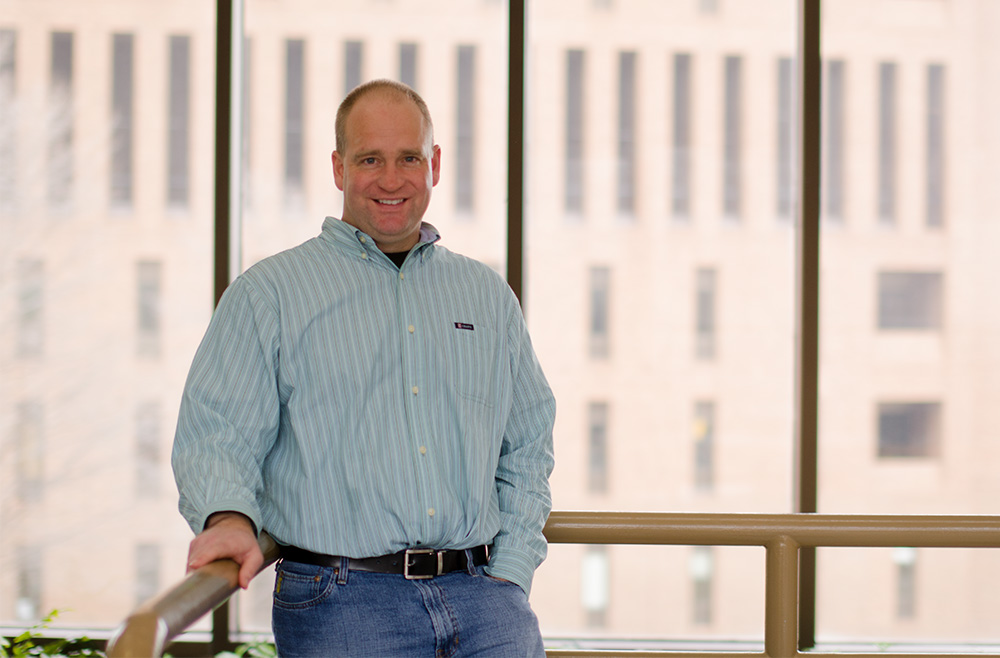Tai Mendenhall has worked as a mental health provider in some of the most difficult situations anyone can imagine—at the heart of the 9/11 attacks, on the ground where hurricanes Katrina and Rita struck, the 2004 East Asian tsunami, the I-35W Bridge collapse, and the 2011 Midwest tornadoes.
He has also worked in places that do not make the news, attending to mental health care needs of victims’ families as well as health care providers in the wake of murders, suicides, and emergency room deaths.
Mendenhall is a medical family therapist and assistant professor in the Department of Family Social Science. In the field now called couple and family therapy (formerly marriage and family therapy), his research, teaching, and public engagement are thoroughly intertwined.
Mendenhall directs the mental health teams in the University’s Medical Reserve Corps, helping to train, supervise, and work collaboratively with a variety of providers, professors, staff, and students in psychological first-aid.
“Fieldwork—whether it’s a large-scale disaster or something comparatively smaller and close to home—brings some of the the hardest clinical work I have ever done,” says Mendenhall. “You’re hearing the worst things you have ever heard and your heart is absolutely breaking, and at the same time you are so inspired with the strength and courage of the human spirit as these families survive and work together.”
By design, both advanced undergrads and graduate students pursuing careers in the mental health professions are involved in these response teams, gaining critical experience.
Mendenhall sees the University of Minnesota as an evolving leader in the country by bridging the worlds of acute and long-term health care in trauma work.
“A lot of folks out there orient their efforts to the immediate needs of patients, families, and communities in the aftermath of a disaster,” he explains, “while many others work in long-term recovery processes and community building. But the two camps often do not talk or coordinate their efforts with each other.”
Here, Mendenhall says colleagues across the department and in public health, social work, family medicine, and psychology, are working in partnership to connect the dots.
“A lot of students are already coming to the Department of Family Social Science and the University of Minnesota because they see us building the bridge between the short-term and long-term.”
Mendenhall also teaches FSoS 1101, Intimate Relationships. It is the largest and the most popular class that the department offers, each semester enrolling up to 240 students from about 70 different majors.
“Everybody is either in or wants to be in an intimate relationship,” says Mendenhall. “We’ve all experienced the joy of love and the pain of breakups, and we want to learn to have better relationships, to experience all the hopes and dreams we have in our personal lives alongside what we’re going to school for professionally. It’s a joy to teach. If I have it my way, I will teach it until I retire.”
He is now writing a textbook for the course in collaboration with previous teaching assistants, discussion group leaders, graduate students, and alumni.
Mendenhall never would have guessed such a career was ahead when he dropped out of college at age 20. But his father, an orthopedic surgeon originally trained in veterinary medicine, helped connect him to an important environment where he could grow. While working fulltime as a surgical technician, Mendenhall began to explore his options. Eventually he discovered the field of family social science. Later, working on a master’s degree in marriage and family therapy (MFT) at Kansas State, he gravitated toward the toughest cases. He began connecting the worlds of mental health and medicine.
“I’m a complete adrenalin junkie so the clinical cases that nobody else wanted were the ones that I really wanted,” he says. Then he came back to Minnesota for his Ph.D. in MFT, where he used his supportive program to branch out. “I took every single class I could take in medicine, like psychopharmacology and nursing, principles of HMO management, risk analysis, biostatistics, because I wanted to build the bridge.”
After an intensive internship in a psychiatry residency in North Carolina, Mendenhall came back to Minnesota again for a position in the U’s Department of Family Medicine and Community Health. His work and his passion for teaching evolved until the Department of Family Social Science became an even better fit.
“So I left a great gig for an even better one,” he says. “All of it—the teaching, the research, the clinical work—comes together for our students. This is what a university is supposed to do. We’ve got more than 50,000 students here—50,000 lives—50,000 dreams. To have any kind of influence that is that meaningful, to be a part of their learning and growth as they work to follow their hearts and their dreams, is truly an honor and a privilege.”
Away from the U, Mendenhall’s favorite hobby is motorcycles. He says he grew up on them, riding with his dad, and they still go on father/son tours together almost every summer.
“I call them my thera-rides,” says Mendenhall. “You reconnect with the world. In a car you can’t feel the hot and cold pockets of air—you can’t smell the smells or experience the environment in the same way when you’re not out in the open like that. Sometimes I just drop everything and go myself. We are all so busy, and things that rejuvenate us are essential.”
Read more about Tai Mendenhall and the Department of Family Social Science.
Story by Michael Moore | February 2013
